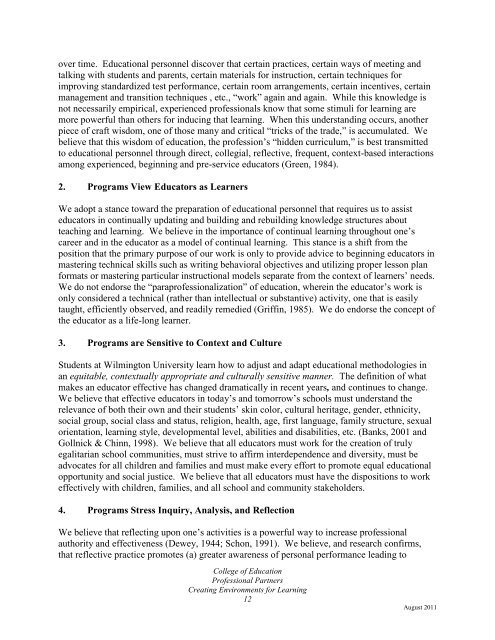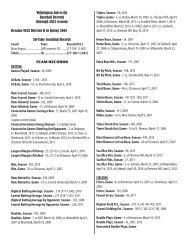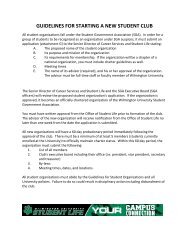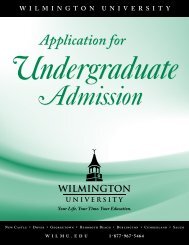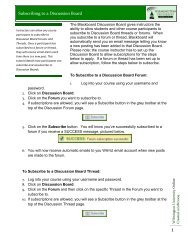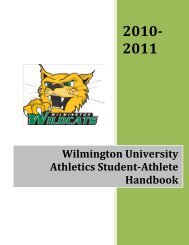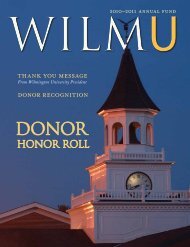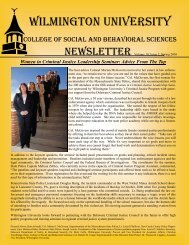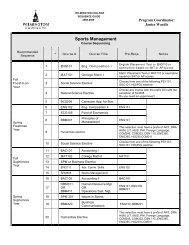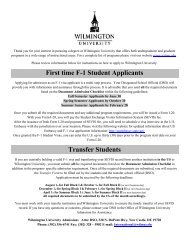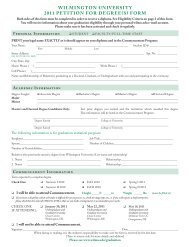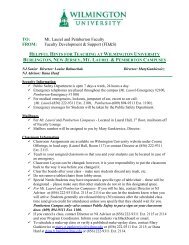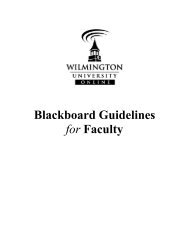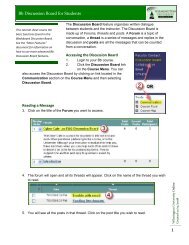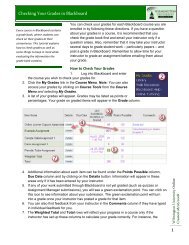over time. Educational personnel discover that certain practices, certain ways of meeting andtalking with students and parents, certain materials <strong>for</strong> instruction, certain techniques <strong>for</strong>improving standardized test per<strong>for</strong>mance, certain room arrangements, certain incentives, certainmanagement and transition techniques , etc., “work” again and again. While this knowledge isnot necessarily empirical, experienced professionals know that some stimuli <strong>for</strong> learning aremore powerful than others <strong>for</strong> inducing that learning. When this understanding occurs, anotherpiece of craft wisdom, one of those many and critical “tricks of the trade,” is accumulated. Webelieve that this wisdom of education, the profession’s “hidden curriculum,” is best transmittedto educational personnel through direct, collegial, reflective, frequent, context-based interactionsamong experienced, beginning and pre-service educators (Green, 1984).2. Programs View Educators as LearnersWe adopt a stance toward the preparation of educational personnel that requires us to assisteducators in continually updating and building and rebuilding knowledge structures aboutteaching and learning. We believe in the importance of continual learning throughout one’scareer and in the educator as a model of continual learning. This stance is a shift from theposition that the primary purpose of our work is only to provide advice to beginning educators inmastering technical skills such as writing behavioral objectives and utilizing proper lesson plan<strong>for</strong>mats or mastering particular instructional models separate from the context of learners’ needs.We do not endorse the “paraprofessionalization” of education, wherein the educator’s work isonly considered a technical (rather than intellectual or substantive) activity, one that is easilytaught, efficiently observed, and readily remedied (Griffin, 1985). We do endorse the concept ofthe educator as a life-long learner.3. Programs are Sensitive to Context and CultureStudents at <strong>Wilmington</strong> <strong>University</strong> learn how to adjust and adapt educational methodologies inan equitable, contextually appropriate and culturally sensitive manner. The definition of whatmakes an educator effective has changed dramatically in recent years, and continues to change.We believe that effective educators in today’s and tomorrow’s schools must understand therelevance of both their own and their students’ skin color, cultural heritage, gender, ethnicity,social group, social class and status, religion, health, age, first language, family structure, sexualorientation, learning style, developmental level, abilities and disabilities, etc. (Banks, 2001 andGollnick & Chinn, 1998). We believe that all educators must work <strong>for</strong> the creation of trulyegalitarian school communities, must strive to affirm interdependence and diversity, must beadvocates <strong>for</strong> all children and families and must make every ef<strong>for</strong>t to promote equal educationalopportunity and social justice. We believe that all educators must have the dispositions to workeffectively with children, families, and all school and community stakeholders.4. Programs Stress Inquiry, Analysis, and ReflectionWe believe that reflecting upon one’s activities is a powerful way to increase professionalauthority and effectiveness (Dewey, 1944; Schon, 1991). We believe, and research confirms,that reflective practice promotes (a) greater awareness of personal per<strong>for</strong>mance leading toCollege of EducationProfessional PartnersCreating Environments <strong>for</strong> Learning12August 2011
improved practice, (b) increased student learning, (c) enhanced professional growth anddevelopment, (d) a more clear and honest perspective about one’s work, and (e) greatersatisfaction with oneself and one’s work (York-Barr, et. al., 2001, p. 13). As reflective inquirers,prospective educators bring personal, social, and theoretical knowledge to bear to promoteinstructional and school improvement. We encourage our students to be inquirers into all aspectsof their learning and practice. This approach is emphasized in the earliest pre-service practicumexperiences and continues throughout middle field experiences, methods courses, and TheTeacher Internship. The approach is central to all programs, including those designed to prepareinstructional leaders, counselors, and specialists.5. Programs Stress Participation, Collegiality and CollaborationParticipation, collegiality, and collaboration are essential ingredients in our conceptualframework. We believe that educational change and improvement cannot be viewed as oneeducator doing a better job in one learning situation. Re<strong>for</strong>ming pedagogy <strong>for</strong> sustained andworthwhile change in schools is a collaborative process requiring educators to be skilled atworking in collaborative work cultures and taking initiatives such as <strong>for</strong>ming broadly-basedfocus or study groups to investigate crucial topics (Johnston, 2000; Lieberman, 1988; Bird &McIntyre, 1999; McIntyre & Byrd, 2000). We take the notions of participation, collegiality, andcollaboration very seriously in individual courses and in program structure. This can be readilyseen in our extensive use of practitioner-professors, our ef<strong>for</strong>ts to utilize a workable collaborativemodel <strong>for</strong> practica and other field experiences and <strong>for</strong> the clinical semester (Gray, 2002), ourfrequent faculty development sessions, our <strong>for</strong>mal linkage of full-time faculty with adjunctfaculty and our working relationships with local schools and school districts and with thecommunity and State.6. Programs are On-Going and Developmental Based on Best PracticeWe believe that the professional life of an effective educator is a continuum, a stream of activitythat begins when a person decides to begin professional and academic study leading toward ateaching career and ends only when the decision is made to end that career (Hoffman &Edwards, 1986, p. 16). We view the development of educators in three stages: pre-serviceeducation, induction, and in-service education. We promote the notion that educators grow andchange, adapt and reconstruct their worlds, and accumulate and discard ideas and practices(Fuller & Brown, 1975). We believe that programs <strong>for</strong> the preparation of educational personnelshould be long-term investments in the educators themselves, in instilling in all educators theunderstanding of best practice as related to the teaching and learning of all children, and in theadvancement of society as a whole. In promoting the on-going and developmental nature of ourprograms, considerable progress has been made in terms of maintaining contacts with graduates,working with graduates to assist in the preparation of our students during fieldwork and clinicalexperiences, completing follow-up surveys to assess student satisfaction with the programs, andcontinually assessing the programs <strong>for</strong> further development and improvement.College of EducationProfessional PartnersCreating Environments <strong>for</strong> Learning13August 2011
- Page 1 and 2: College of EducationHANDBOOK FORCOO
- Page 3 and 4: TABLE OF CONTENTSCollege of Educati
- Page 5 and 6: We envision our students, as they t
- Page 7 and 8: Master of Education in School Leade
- Page 9 and 10: group and individual interviews hel
- Page 11: to make judgments, come to informed
- Page 15: Improved oral and written communica
- Page 18 and 19: PREREQUISITES:The Teacher Internshi
- Page 20 and 21: Learning Outcomes/Learning Activiti
- Page 22 and 23: 9.2 participate in professional dis
- Page 24 and 25: 13.10 appreciates the importance of
- Page 26 and 27: handbooks. Teacher Interns are aske
- Page 28 and 29: TYPICAL (SUGGESTED) SCHEDULE* FOR 4
- Page 30 and 31: 12. Participate in regular progress
- Page 32 and 33: 37. School/district policies regard
- Page 35 and 36: Finally, I want you to summarize th
- Page 37 and 38: You could also try offering some op
- Page 39 and 40: documentation.Recommend early inter
- Page 41: LESSON PLANNING USING THE WIMU TEMP
- Page 44 and 45: In any event, solo teaching should
- Page 46 and 47: Clinical semester credits may, unde
- Page 49 and 50: In many cases, the rubrics let you
- Page 51 and 52: APPENDIX:BS, MEE, and MAT Program P
- Page 53 and 54: SCORINGELEMENTS1.2 Understanding of
- Page 55 and 56: 2.2 Understanding ofhuman developme
- Page 57 and 58: SCORINGELEMENTS3.1 Understanding of
- Page 59 and 60: Teacher Preparation ProgramsScoring
- Page 61 and 62: Teacher Preparation ProgramsScoring
- Page 63 and 64:
Teacher Preparation ProgramsScoring
- Page 65 and 66:
6.5Understanding ofhow to maximizet
- Page 67 and 68:
Teacher Preparation ProgramsScoring
- Page 69 and 70:
Teacher Preparation ProgramsScoring
- Page 71 and 72:
8.3 Thecandidatedemonstratesknowled
- Page 73 and 74:
(teacher-designed); (3)publisher-de
- Page 75 and 76:
SCORINGELEMENTSUNSATISFACTORY1EMERG
- Page 77 and 78:
SCORINGELEMENTS10.2 Understands sch
- Page 79 and 80:
strategies, equitablydistributing r
- Page 81 and 82:
SCORINGELEMENTS11.2 Understands how
- Page 83 and 84:
SCORINGELEMENTS12.2 Understands leg
- Page 85 and 86:
13.3 Candidateunderstands theimport
- Page 87 and 88:
Teacher Preparation ProgramsScoring
- Page 89 and 90:
College of EducationMASTER OF EDUCA
- Page 91 and 92:
Implement Strategies - Develop and
- Page 93 and 94:
Implement strategies towards assist
- Page 95 and 96:
CEC Standard -SevenInstructionalPla
- Page 97 and 98:
during discussion, (3)rephrasing qu
- Page 99 and 100:
identify achievementgain and diffic
- Page 101 and 102:
3.5 The candidatedemonstratesknowle
- Page 103 and 104:
Wilmington UniversityClinical Repor
- Page 105 and 106:
What data will indicate that the st
- Page 107 and 108:
of the elements in the rubric?Time
- Page 109 and 110:
Wilmington University Teacher Prepa
- Page 111 and 112:
Wilmington UniversityCollege of Edu
- Page 113 and 114:
Competency 2: Human Development and
- Page 115 and 116:
Competency 5: Learning Environment
- Page 117 and 118:
Competency 7: Instructional Strateg
- Page 119 and 120:
Competency 9: Professional Growth -
- Page 121 and 122:
Competency 12: Professional Conduct
- Page 123 and 124:
Competency 14: Employment - Obtain
- Page 125 and 126:
Narrative Comments (Optional)Teache
- Page 127 and 128:
Delaware Standards: This should inc
- Page 129 and 130:
Formative Assessment (ongoing) How
- Page 131 and 132:
Formative Assessment (ongoing) How
- Page 133 and 134:
REFLECTION SHEETTeacher/Teacher Int
- Page 135 and 136:
.COOPERATING TEACHER STIPENDIn orde


